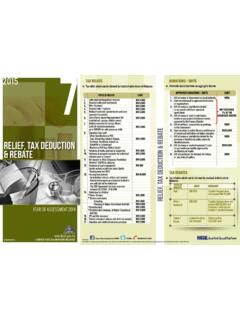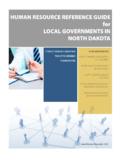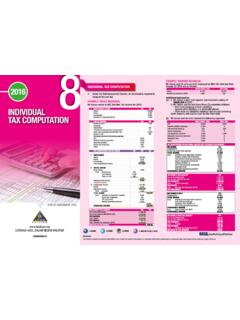Transcription of Approved Public Benefit Organisations - The NPO …
1 1 | P a g e Tax benefits For Approved Public Benefit Organisations Prepared by RICARDO WYNGAARD ATTORNEYS Copyright 2011 Disclaimer: This document is aimed at serving as a guide and may not be applicable to all specific circumstances. Professional assistance should be obtained before acting on any of the information in this document. Contents Introduction: .. 2 What are the main tax benefits for NPOs? .. 2 How can NPOs access those benefits ? .. 2 How can NPOs obtain PBO Approval? .. 2 The procedure to become a PBO: .. 3 What are donor deductible contributions? .. 4 How is the Benefit claimed? .. 4 Donations Tax: .. 5 Capital Gains Tax: .. 5 Transfer duty.
2 5 Estate duty:.. 5 Skills Development Levy:.. 5 2 | P a g e Introduction: Non-profit Organisations (NPOs) can access a number of benefits in terms of the Income Tax Act. These benefits can significantly contribute towards the financial sustainability of a NPO. This document is a summary of the main tax benefits available to NPOs. What are the main tax benefits for NPOs? The main benefits available to NPOs are: 1. Being fully exempted from paying income tax if it carries on no or limited trading activities. And being partially exempted from paying income tax in situations where its trading income exceeds the limitations contained in Section 10 (1) (cN).
3 2. Being able to receive donor deductible contributions. Only Approved Public Benefit Organisations (PBOs) with status in terms of section 18A can issue receipts to their donors for donations received which will allow the donors to make deductions from their taxable income. 3. Accessing other tax benefits that are reliant on the organisation s PBO status. These include exemptions from transfer duty, estate duty, capital gains tax, donations tax, the skills development levy and dividends tax. How can NPOs access those benefits ? To access the main tax benefits , NPOs must become Approved PBOs. An organisation s approval as a PBO is the first step to access the other benefits listed above.
4 Benefit 1: Section 30 Tax Exemption Tax exemption (or partial tax exemption for those PBOs that exceed the trading restrictions) can only be accessed if NPOs are Approved PBOs. How can NPOs obtain PBO Approval? Section 30 provides that the Commissioner for the South African Revenue Service (SARS) can only approve PBOs that comply with the requirements listed in that section. In order to become an Approved PBO, an organisation must be a non-profit organisation in the form of: A Section 21 Company A Non-profit Trust, or An Association of Persons. And it must carry on one or more Public Benefit activities (PBAs) listed in Part I of the Ninth Schedule to the Income Tax Act.
5 3 | P a g e The procedure to become a PBO: NPOs must complete the prescribed application form (EI 1) and submit it to the Tax Exemption Unit (TEU) at SARS in Pretoria. Section 30 further requires that the NPO s founding document must contain prescribed clauses dealing with the following issues: a. At least three persons who are not related to each other must accept the fiduciary responsibility of the PBO. b. The funds of the PBO cannot be distributed to any person, except in the course of carrying on its Public Benefit activity. c. The PBO must upon dissolution, transfer its assets to any similar Approved PBO, a prescribed parastatal or a government department.
6 D. The PBO is not allowed to accept any donation which may be revoked by the donor for reasons other than a material failure to conform to the designated purposes and conditions of such donation, including any misrepresentation with regard to the tax deductibility thereof in terms of section 18A. e. Any amendment to the PBO s founding document must be submitted to the Commissioner. Other conditions: The organisation must satisfy the Commissioner that it: a. Is or was not knowingly a party to any transaction, operation or scheme of which the sole or main purpose is or was the reduction, postponement, or avoidance of liability for any tax, duty or levy. b. Does not pay employees or office-bearers excessive remuneration, having regard to what is generally considered reasonable in the sector and in relation to the service rendered.
7 It complies with the reporting requirements determined by the Commissioner. c. Takes reasonable steps to ensure that funds are utilised for the purpose for which it had been provided, if it is providing funding to an association of persons engaging in Public Benefit activities. d. Has not or will not use its resources directly or indirectly to support, advance, or oppose any political party. e. Complies with such conditions as the Minister of Finance may prescribe by way of regulation. NB: If these clauses are not in the founding document of the NPO, three fiduciaries must sign a written undertaking containing these clauses. 4 | P a g e Benefit 2: Section 18A Donor Deductible Contributions What are donor deductible contributions?
8 Section 18A allows taxpayers to make a deduction from their taxable income when they make donations to certain Organisations . A donation will only qualify for a deduction if it complies with the following requirements listed under section 18A: The donation must be made to an Approved PBO that has status under section 18A (commonly referred to as donor deductible status). The PBO must use the donation to carry out a Public Benefit activity listed under Part II of the Ninth Schedule of the Income Tax Act. Alternatively, the PBO must provide funds to a PBO carrying on such activities. The donation must have been made bona fide and should not be a payment for services which the organisation has rendered to the taxpayer.
9 The donation can either be in cash or kind, but not in the form of a service, and The donation cannot exceed ten percent of the taxpayer s taxable income. If it exceeds ten percent the excess amount will not qualify for tax deduction. Donors, especially corporate donors, prefer to make donations to PBOs with section 18A status as the value of that donation would be deducted from their taxable income. How is the Benefit claimed? The PBO which received the donation issues a receipt to the donor. Donors can claim the tax deduction from SARS when submitting their tax returns by attaching the 18A receipt received from the PBO. The tax receipt issued by the PBO must have the following information on it: Section 18A reference number issued by the Commissioner of SARS, The date that the donation was received by the PBO, The PBO s name and address, The donor s name and address, The amount of the donation or the nature thereof (if in-kind), and A certification that the receipt is issued for the purposes of section 18A and has or will be used exclusively for the object of the PBO.
10 PBOs carrying activities listed on Part I and Part II Under Section 18A (2A), a PBO carrying on activities covered by both Parts I and II of the Ninth Schedule must ensure that donations are only used towards activities listed under Part II; the PBO must issue receipts for such donations and provide them along with their annual audit as proof of financial integrity. 5 | P a g e Benefit 3: Ancillary Tax benefits Approved PBOs can also access, amongst other, the following ancillary tax benefits : Donations Tax: Donations to Organisations (that are not Approved PBOs) will attract 20% donations tax on amounts above: R100 000-00 in respect of individuals, and R10 000-00 in respect of legal entities, except Public companies.









